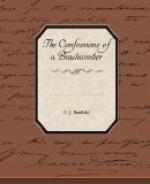Mattie (with a downcast air)—“My word! Bo’sun (the brother-in-law) gib it letter belonga Mickie.”
“Where letter?” I asked.
Mattie—“Me got ’em,” and drawing out a very soiled little parcel, he proudly exposed a piece of greyish wood, about the size and shape of a lead pencil, on which had been cut two continuous intersecting grooves. “Me giv’ ’em Mickie; Bo’sun alonga Cooktown. He want to come up this way now.”
The letter was a mere token of material expression of the fact that the sender was in the land of the living, and of his faith in the bearer, who was charged with all the personal messages and news. It was a sad rebuff to Mattie, elated with responsibility and eager to unburden himself of the latest domestic intelligence, to find that Mickie was not on the spot to receive it all. And, after fondling the wooden document for a while, he wrapped it up and carefully bestowed it within the bosom of his shirt. The disappointment was general. The gleam faded from the faces of the boys. For several days, first one and then another was entrusted with the honourable custody of the missive. Whoever possessed it for the time being was the most favoured individual. His worthiness for the office he acknowledged with an amusing air of self-consciousness and pride. The transmission of a letter is not an ordinary occurrence, and though there is an entire absence of form and ceremony in its delivery, the rarity of the event lends to it novelty and importance.
Aboriginal letters are of great variety, and some there are who profess to interpret them. The despatches are, however, invariably, in my experience, transmitted from hand to hand, the news of the day being recapitulated at the same time. It is not essential that the unstudied cuts and scratches on wood should have any significance or be capable of intelligible rendering. Though blacks profess to be able to send messages by means of sticks alone, the pretension is not recognised by those who have crucially investigated it
On a certain station a youthful son of the proprietor was accidentally drowned in a creek not far from the homestead. The grief of the parents was participated in by all engaged on the station, for the boy, full of promise, had been a general favourite. None seemed more sorrowful and gloomy than the blacks camped in the neighbourhood, and when the first shock of sorrow was of the past, they were eager to send the news to distant friends. A letter was laboriously composed. It was a short piece of wood, narrow and flat; an undulating groove ran from end to end on one side, midway was an intersecting notch. These were the principal characteristics, but there were other small marks and scratches. Bearing this as his credentials, a messenger departed, and in a week or so members of camps hundreds of miles away had seen the letter and were in possession of all the details of the sad event, the messenger in the meantime having returned. The letter was




